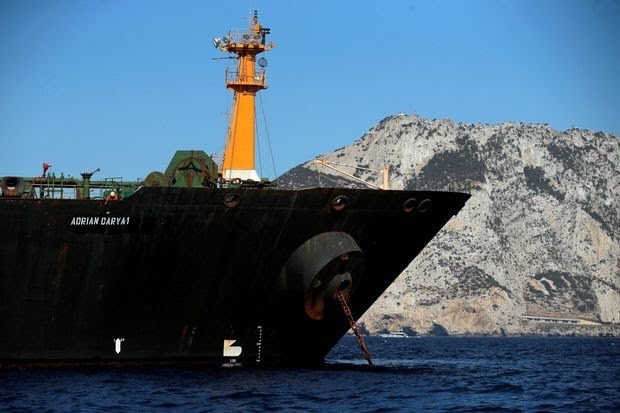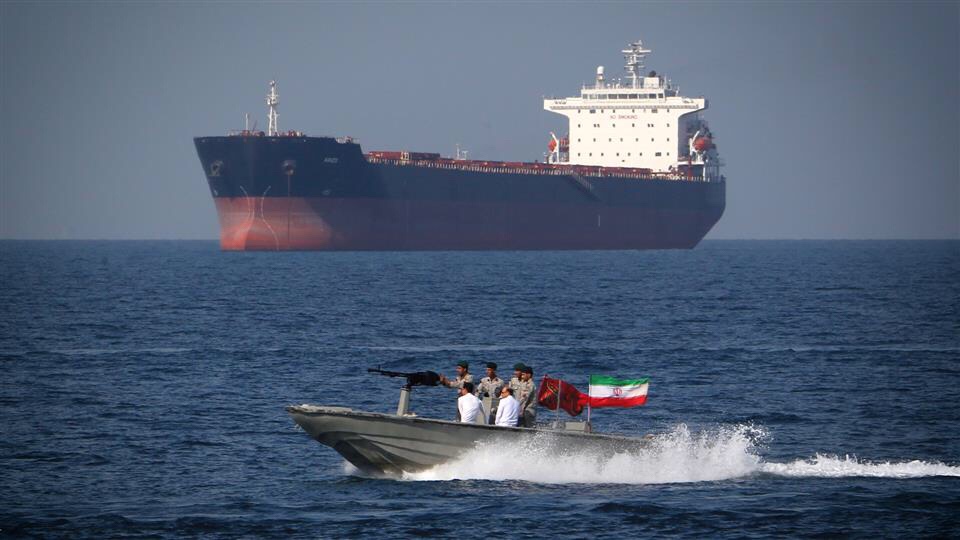
Iranian tanker Adrian Darya 1 was anchored in the Strait of Gibraltar over the weekend and is currently sailing toward Greece.PHOTO: JON NAZCA/REUTERS
U.S. Warns Greece Against Assisting Iran Oil Tanker
State Department advises companies, mariners of immigration and potential criminal consequences for aiding vessel
By Benoit Faucon
Updated Aug. 20, 2019 1:28 pm ET
LONDON—The U.S. warned Greece against assisting the Iranian tanker released by Gibraltar as it continues efforts to block the vessel and further drags its allies into escalating tensions between Washington and Tehran.
“We have conveyed our strong position to the Greek government on the matter, as well as all ports in the Mediterranean that should be forewarned about facilitating this vessel,” the State Department said.
A Greek Foreign Ministry official confirmed that the country had received the warning. But he also said that Greece’s maritime authorities had received no request for mooring at its ports or any other communication from the vessel.
A separate Greek government official said, “Any decision will be in line with European Union rules on Iran.” The official didn’t elaborate.
But while Athens usually follows the EU line on foreign policy, a diplomat involved in the matter said the government is seriously looking into the U.S request.
“Once the ship’s path is clear, a decision will be taken on what to do with this vessel,” he said.
The Iranian tanker Adrian Darya 1, previously called the Grace 1, is moving eastward toward Kalamata, Greece, and is expected to arrive there on Monday, according to shipping tracker MarineTraffic. It remains unclear if the vessel would be forced to reroute after the latest U.S. threat.
The tanker left Gibraltar’s waters late Sunday after the territory’s Justice Ministry rejected a warrant from the U.S. Justice Department seeking its seizure for alleged violations of American sanctions. Gibraltar officials said the territory follows the European Union’s laws, not the U.S.’s.
The departure had been delayed by the U.S. warrant and difficulty finding a crew after Gibraltar released the ship last week upon receiving assurances from Tehran that the 2.1 million barrels of crude oil the vessel was carrying wouldn’t go to Syria. Unlike the U.S., the EU doesn’t prohibit Iranian oil sales in general.
The U.S. has said the Adrian Darya was assisting the Islamic Revolutionary Guard Corps, which it has designated a terrorist organization, by transporting oil from Iran to Syria.
Does the U.S. risk escalating tensions with Iran by seizing its oil? Join the conversation below.
“It is important for companies, and mariners to know that any efforts to assist these tankers could be considered as providing material support to a U.S.-designated Foreign Terrorist Organization (FTO), which has immigration and potential criminal consequences,” a State Department representative added. Possible action includes severe terms in prison and fines, and revoking visas held by crew members.
Iran hasn’t commented on the latest U.S. threat. It has warned Washington against any new attempt to seize the tanker, saying there would be consequences, without elaborating.
“If this is done or even stated, it is a threat to free shipping,” Iran’s Foreign Ministry spokesman Abbas Mousavi said Monday, according to the state-run IRNA news agency.
The threat to commercial shipping in the Strait of Hormuz—through which a third of the world’s seaborne oil is transported—has increased already high tensions between the West and Iran after the U.S. withdrew from the 2015 nuclear deal and imposed harsh economic sanctions on Tehran. Its European allies—the U.K., Germany and France—have refused to leave the pact, and have worked to keep the deal alive despite U.S. pressure.

Oil, Defense and Sanctions: Why the Strait of Hormuz Is So Volatile
As tensions between the U.S. and Iran rise, a series of incidents has put a strategic maritime waterway back into the spotlight: The Strait of Hormuz. WSJ’s John Simons explains. Photo: Getty Images
Iranian officials also have warned that the British-flagged tanker Stena Impero, which Iran captured in the Persian Gulf last month on accusations that it broke international maritime rules, wouldn’t be released until the Adrian Darya 1 reached its destination.
On Tuesday, the U.K. Foreign Office said there was no comparison or linkage between Iran’s illegal seizure of, and attacks on, commercial shipping vessels in the Persian Gulf region and the enforcement of EU sanctions on Syria.
“Freedom of navigation for commercial shipping must be respected and international law upheld,” it said.
The British-flagged vessel’s seizure also came after several attacks on commercial tankers in the Persian Gulf region, which the U.S. accused Iran of orchestrating. Tehran denied the allegation. The U.K., meanwhile, sent a second warship to protect British vessels in the area and said it would join a U.S.-led coalition to protect maritime traffic there.
A local shipping-services provider, who declined to be named because of the sensitivity of the matter, said Monday that the vessel planned to get fresh supplies and a new crew in Kalamata.
The shipping-services provider, who was approached by a broker representing the Adrian Darya 1’s owner, said the vessel was also seeking options to unload its cargo to another vessel off Kalamata. He said local authorities had warned local agents to check the final destination of the crude oil to comply with European Union sanctions against Syria.
No comments:
Post a Comment